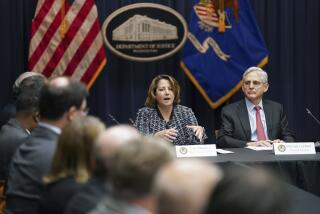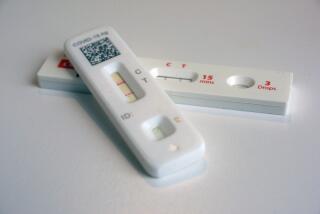U.S. Beefs Up Attack on Health-Care Fraud
- Share via
WASHINGTON — On the heels of a $325-million Medicare fraud settlement with SmithKline Beecham Clinical Laboratories, the federal government disclosed plans Monday for a major expansion of efforts to detect medical providers who bill Medicare and Medicaid for services they did not perform.
Atty. Gen. Janet Reno, leading a parade of officials to highlight the fraud issue, said companies dealing with the federal government’s health programs should adopt voluntary internal guidelines to prevent or detect fraud.
“We expect businesses to take these steps on their own initiative, before any unlawful conduct occurs,” Reno said. For those who ignore this advice, she warned, “we will bring the full weight of the government’s power to bear to enforce the law and protect the American people from being ripped off.”
With last week’s settlement with SmithKline Beecham, the government has collected $800 million from laboratories that cheated Medicare by performing blood and urine tests that were not ordered by doctors or by falsifying test results, law enforcement officials said.
June Gibbs Brown, inspector general of the Department of Health and Human Services, told a news conference at the Justice Department that her staff of auditors and investigators, now 960, will be increased by 20% this year and will double by 2002.
An aggressively expanded war against fraud will be waged “across the whole spectrum” of health spending, said Bruce Vladeck, who runs Medicare, the program for those over 65 and the disabled, and Medicaid, which pays the health bills for the poor.
New guidelines for medical laboratories will be followed soon by plans for other segments of the health-care industry, officials said. The laboratory compliance guide calls for companies to have written standards of conduct, a compliance officer and periodic audits.
The General Accounting Office, the investigative arm of Congress, has estimated that 10% of federal health spending is consumed by fraud or waste. HHS is trying to “pin that down a little more,” getting more precise estimates by looking more closely at various programs, Brown said. Medicare spends about $200 billion a year.
The government is now concentrating more efforts on home health-care spending, the fastest-growing portion of Medicare.
Medicare’s troubled financial situation--the hospital trust fund is expected to run out of money in 2001--makes it even more important to minimize waste and fraud, Vladeck said. Cases such as the SmithKline settlement have a dual benefit, recovering money now and “having a sentinel effect for the future” by discouraging potential wrongdoers, he said.
The settlement announced is the latest installment in a two-year investigation called “Operation LabScam.” Laboratories told doctors that extra tests would be performed for free--at the same time the labs were billing Medicare for millions of these unnecessary tests, according to the Justice Department.
Michael Stiles, U.S. attorney for the eastern district of Philadelphia, said the SmithKline case involved blood and urine tests, with the company “adding on tests that were not ordered and not medically necessary.”
In addition to the tests that weren’t needed, SmithKline sometimes faked results, Stiles said.
Philadelphia-based SmithKline said Monday that it “never intentionally violated any laws.”
“Part of the problem, not just for SmithKline, but for the entire industry, lies in ambiguities over regulations and guidelines,” the company said. “Although we believe we have strong defenses, our decision to settle this case was driven by the enormous potential costs and uncertainties connected with lengthy litigation. It was simply too great a risk to our shareholders, employees and customers.”
More to Read
Sign up for Essential California
The most important California stories and recommendations in your inbox every morning.
You may occasionally receive promotional content from the Los Angeles Times.













